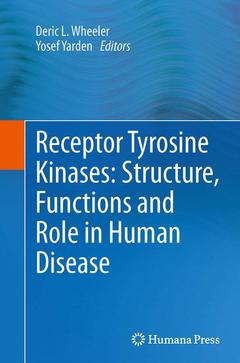Description
Receptor Tyrosine Kinases: Structure, Functions and Role in Human Disease, Softcover reprint of the original 1st ed. 2015
Structure, Functions and Role in Human Disease
Coordinators: Wheeler Deric L., Yarden Yosef
Language: English
Subject for Receptor Tyrosine Kinases: Structure, Functions and Role...:
Keywords
Publication date: 09-2016
Support: Print on demand
Publication date: 11-2014
440 p. · 15.5x23.5 cm · Hardback
Description
/li>Contents
/li>Biography
/li>Comment
/li>
Receptor Tyrosine Kinase: Structure, Functions and Role in Human Disease, for the first time, systematically covers the shared structural and functional features of the RTK family. Receptor Tyrosine Kinases (RTKs) play critical roles in embryogenesis, normal physiology and several diseases. And over the last decade they have become the Number 1 targets of cancer drugs. To be able to conduct fundamental research or to attempt to develop pharmacological agents able to enhance or intercept them, it is essential first to understand the evolutionary origin of the 58 RTKs and their roles in invertebrates and in humans, as well as downstream signaling pathways. The assembly of chapters is written by experts and underscores commonalities between and among the RTKs. It is an ideal companion volume to The Receptor Tyrosine Kinase: Families and Subfamilies, which proceeds, family by family through all of the specific subfamilies of RTKs, along with their unique landmarks.
Dr. Deric Wheeler received an M.S. in pathology from the University of Iowa and a Ph.D. in cancer biology from the University of Wisconsin. He conducted his postdoctoral training at the Fred Hutchinson Cancer Research Center in Seattle, WA, and at the University of Wisconsin School of Medicine and Public Health in Madison, where he eventually transitioned to faculty as an assistant professor in the department of human oncology. Dr. Wheeler’s lab research centers on resistance to molecular targeting agents and the role of subcellular localization of receptor tyrosine kinases and their roles in oncogenesis.
Dr. Yosef Yarden received a Ph.D. in molecular biology from the Weizmann Institute of Science in Rehovot, Israel. He completed postdoctoral training at Genentech, Inc. in San Francisco and at the Massachusetts Institute of Technology in Cambridge. He returned to the Weizmann Institute of Science first as an assistant professor and then later as a full professor. His past administrative responsibilities at the Weizmann Institute include Dean of the Faculty of Biology, Vice-President for Academic Affairs, Director of the M.D. Moross Institute for Cancer Research, and Dean of the Feinberg Graduate School. Dr. Yarden’s lab research centers on the roles played by growth factors and receptor tyrosine kinases in tumor progression.
Leading scientists and researcher providing cutting-edge data
A comprehensive resource that summarizes what we know about receptor tyrosine kinases
An incredible resource to researchers and clinicians and would be utilized by a large audience including, professors, postdocs, graduate students, and scientists in both academic science and industry
Includes supplementary material: sn.pub/extras
These books may interest you

Receptor Tyrosine Kinases 143.27 €



